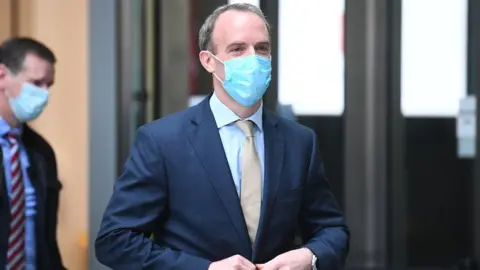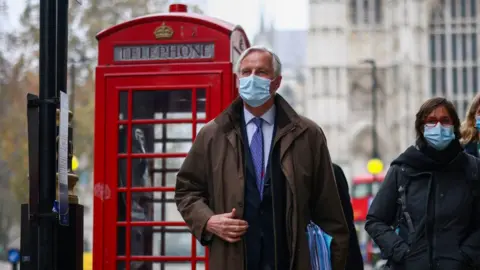Brexit: UK in 'last leg' of trade talks with EU, says Raab
 PA Media
PA MediaThe UK is in the "last leg of negotiations" with the EU over a post-Brexit trade deal, the foreign secretary has said.
Dominic Raab told the BBC it was likely the talks were entering the "last real major week", and an agreement remained possible if the EU showed "pragmatism".
He added that the talks now depended on resolving a "fairly narrow" set of issues, including fishing rights.
Negotiators are racing to reach a deal, with a looming deadline in four weeks.
Face-to-face discussions resumed in London over the weekend, after chief EU negotiator Michel Barnier left self-isolation following a colleague's positive Covid-19 test last week.
The two sides are trying to strike an agreement to govern their trading relationship after the UK's post-Brexit transition period ends on 31 December.
Speaking on the BBC's Andrew Marr programme, Mr Raab said: "We're down to really two basic issues, but I think in particular the issue around fisheries.
"I do think this is a very significant week, the last real major week, subject to any further postponement of the goalposts in terms of the timing."
He added that a deal was subject to the EU accepting the "point of principle" that the UK would require "control" over its fishing grounds after the transition.
"If the EU understand that point of principle and we have some pragmatism, we can get there," he said.
"We ought to be able on both sides to resolve fisheries, if you take the context of the wider economic gains and potential downsides of not having a further deal."
Speaking earlier to Sky's Sophy Ridge, he said the UK was prepared to "talk about transitions and things like that" on fishing rights, but the "point of principle" on control would have to be respected.
 Reuters
ReutersAhead of in-person negotiations resuming on Saturday, Mr Barnier said the "same significant divergences persist" between the two sides.
Negotiators had continued via video-link for the past week or so, after the positive Covid-19 test in a member of the EU negotiating team.
Alongside fishing, the Frenchman has for a while said post-Brexit competition rules and how any deal would be enforced remain the most difficult areas.
The two sides are continuing to haggle over how much access European fishing boats should have to British waters, and how much they would be allowed to catch from next year.
They are also at odds over how closely the UK should have to follow the EU's social, labour, and environmental standards after the transition.
Transition deadline looms
The UK left the EU on 31 January, but it is continuing to follow the bloc's rules until the end of the year as part of an 11-month transition period.
If a trade deal is not agreed by then, trading between the two will default to World Trade Organization rules.
The EU and UK can keep negotiating if they want to after this, but the two sides would face import taxes on goods traded between them.
The UK would have no access to the EU's energy market, and no agreement on police and judicial co-operation.
Labour stance
On Sunday, Labour leader Sir Keir Starmer said his party would decide whether to vote for or abstain on any deal reached, after examining the final agreement.
Speaking at an online conference for a party affiliate group, he said: "This is an important discussion within our party, and I'm obviously listening to a number of different views on it."
"I don't think there's really much of a case for voting against it, when that would effectively be to vote for no deal," he added.
Last month the UK's chief negotiator Lord David Frost said he assumed MPs would have to vote on a law to implement "at least some elements" of a deal.
